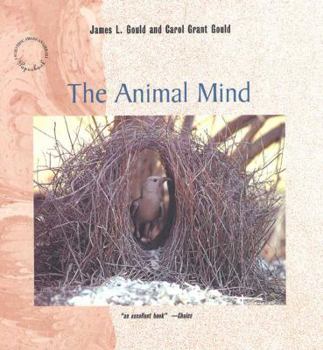The Animal Mind
(Book #51 in the Scientific American Library Series Series)
Select Format
Select Condition 
Book Overview
Green Herons toss breadcrumbs into the water to attract fish - have they been watching human anglers? Do they know what they are doing? Termites cut air shafts into their nests - do they understand?... This description may be from another edition of this product.
Format:Paperback
Language:English
ISBN:0716760355
ISBN13:9780716760351
Release Date:January 1999
Publisher:W.H. Freeman & Company
Length:236 Pages
Weight:1.40 lbs.
Dimensions:0.7" x 8.5" x 9.3"
Customer Reviews
3 ratings
AN INTERESTING ARGUMENT THAT THE GAP BETWEEN ANIMAL AND HUMAN COGNITION ISN'T THAT LARGE
Published by Thriftbooks.com User , 14 years ago
James L. Gould is an ethologist, and wife Carol Grant is a science writer. They state in the Prologue to this 1994 book, "In many ways this book recapitulates the slow but steady breaking down of the walls of resistance put up by a scientific community determined never again to be blinded by the cleverness of Hans. We will begin by formulating some working definitions of thinking and cognition ... Then we will look at how the remarkable sensory abilities and innate programming of animals can create in our eyes the illusion of thought where none need exist... Next we will examine a variety of species and types of behavior, in search of the animal mind. Finally, we will reflect on what our growing knowledge about animal cognition says about the human mind as a remarkable product of natural selection, and how a more complete understanding of what goes on in the minds of animals can, aside from its inherent intellectual interest, show us links between the brain's mysterious processes and our own often inscrutable but always fascinating behavior." They observe, "The word-based communication being taught to animals is probably serving simply as a window into the minds of the few species researchers have to date discovered hwo to reach. As we will see, though, there remains the lively possibility that language instruction greatly amplifies the ability of an animal to make logical deductions." They state in their conclusion, "In the end, it seems that both the in-kind and in-degree arguments have part of the answer about human creativity and uniqueness. We have seen that no single isolated aspect of human cognitive ability is in fact unique. Animals of many species can engage, at least in certain contexts, in the kind of goal-oriented behavior that requires thinking and planning. Many species can categorize and classify to some degree; many seem to imagine objects or events."
An intriguing look at the thought processes of other species
Published by Thriftbooks.com User , 17 years ago
Humans often assume that our form of cognition is absolutely superior; for centuries we've used this as an excuse to treat animals as automatic lower beings, and to justify abuse. It has only been in recent decades that serious research has gone into the way that animal minds work, showing that while the way they think is different, it's not necessarily inferior. The Animal Mind is an in-depth look at animal psychology, and how stimuli and conditioning shape the behaviors of various species. The authors provide examples from numerous tests of animal behavior and learning in lab settings, as well as show how animals learn and adapt in nature itself. Their research demonstrates a sometimes surprising level of thought on the part of species ranging from bees to beavers. The final chapter explores the human mind in light of the previous material, exploring the possibility that just as weaving grass and other fibers is a behavior that selectively evolved in many species of bird, and the relationship between the honey guide and the honey badger evolved as a special relationship required for survival, so it's possible that we simply selectively evolved certain patterns of cognition in the direction of reason rather than, say, weaving nests. It also humbles humanity a bit by showing that had our own stimuli gone a little differently, we'd be a very different species right now. Overall, a fascinating look at animal psychology from the perspective of the human animal.
an important contribution to current topic
Published by Thriftbooks.com User , 26 years ago
The behaviorist school of psychology has so dominated research for almost 60 years. Finally, the tide is beginning to turn in the opposite direction. New research is showing without doubt that humans have underestimated animals to an extreme degree. This book examines the "Umwelt" of various animals and illustrates very complex behavior, even in animals as startling different than us as the honeybee. The authors are honeybee behavior researchers. Other works on the subject have come from researchers working with Mammals. Beautifully illustrated.





